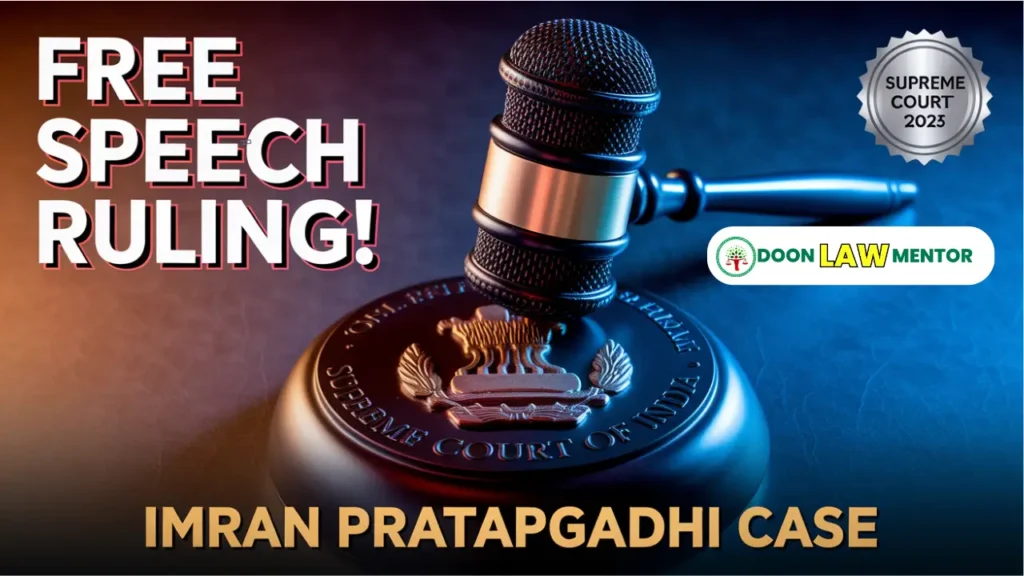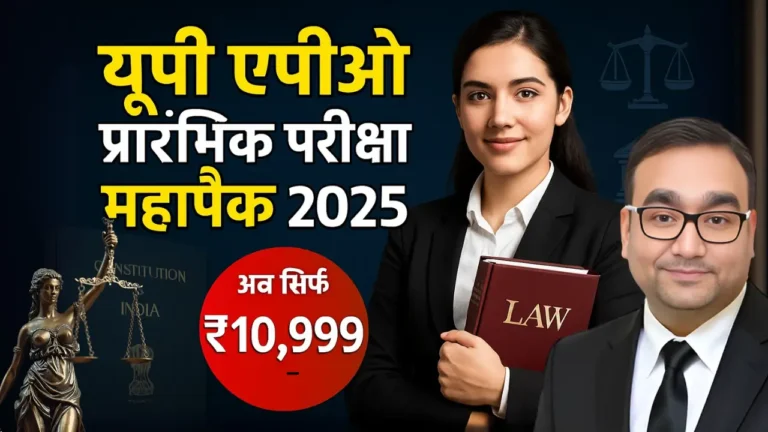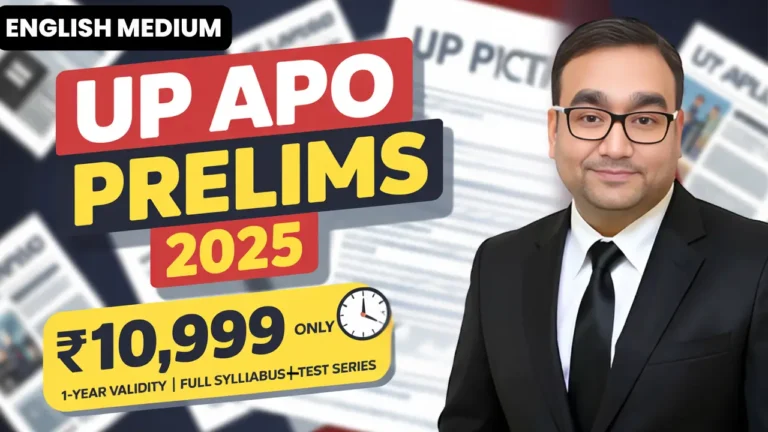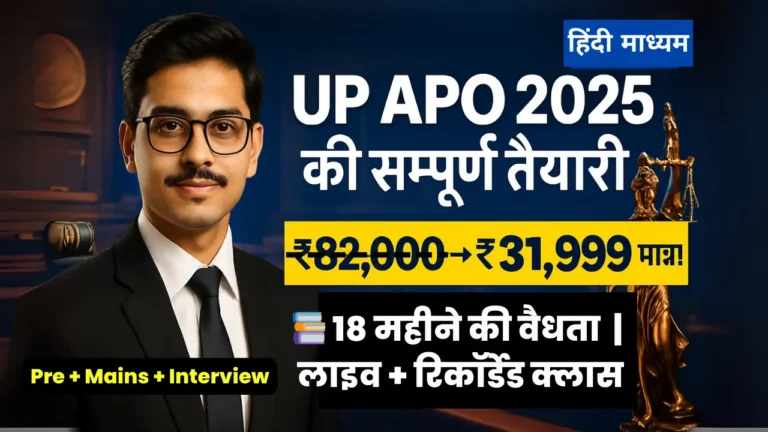In Imran Pratapgadhi v. State of Gujarat (2025 SC), the Supreme Court quashed an FIR against Congress MP Imran Pratapgadhi, clarifying Section 173(3) BNSS 2023 on preliminary enquiry before FIR registration and emphasizing the protection of freedom of speech under Article 19(1)(a). Justices Abhay Oka and Ujjal Bhuyan addressed conflicts with Lalita Kumari (2014), setting a precedent for speech-related offences. This blog analyzes the case, its legal implications, and its relevance for Judiciary, APO, and JLO aspirants preparing for 2025 exams.
Table of Contents
Introduction
On March 28, 2025, the Supreme Court of India delivered a landmark judgment in Imran Pratapgadhi v. State of Gujarat (2025 SC), quashing an FIR filed by the Gujarat Police against Congress Rajya Sabha MP Imran Pratapgadhi over an Instagram post featuring the poem “Ae khoon ke pyase baat suno.” Justices Abhay Oka and Ujjal Bhuyan not only addressed the misuse of criminal law against artistic expression but also clarified the application of Section 173(3) of the Bharatiya Nagarik Suraksha Sanhita (BNSS) 2023, which governs preliminary enquiries before FIR registration. The court held that such enquiries are normally mandatory for speech-related offences punishable with three to seven years, protecting freedom of speech under Article 19(1)(a). This blog provides a detailed case analysis of Imran Pratapgadhi v. State of Gujarat, exploring its background, key findings, legal implications, and significance for Judiciary, APO, and JLO aspirants preparing for 2025 exams.
Background of the Case: Imran Pratapgadhi v. State of Gujarat
The case originated from an FIR filed by the Gujarat Police at City A-Division Police Station, Jamnagar, against Congress Rajya Sabha MP and poet Imran Pratapgadhi for an Instagram post. The post featured a 46-second video clip of Pratapgadhi walking while flower petals were showered on him, with the poem “Ae khoon ke pyase baat suno” playing in the background. The FIR, registered under Sections 196 (promoting enmity between groups), 197(1) (statements conducing to public mischief), 299 (deliberate intent to wound religious feelings), 302 (public mischief), and 57 (common intention) of the Bharatiya Nyaya Sanhita (BNS) 2023, alleged that the poem was provocative, detrimental to national integration, and hurt religious sentiments.
Procedural History
- Gujarat High Court Ruling: On January 17, 2025, the Gujarat High Court refused to quash the FIR, noting that the poem’s reference to “the throne” and public responses suggested a potential disturbance to social harmony. The court emphasized that as an MP, Pratapgadhi should have known the repercussions of such a post and avoided actions that could disrupt communal harmony. It also cited Pratapgadhi’s lack of cooperation with the investigation, as he failed to respond to police notices.
- Supreme Court Appeal: Pratapgadhi, represented by Senior Advocate Kapil Sibal, challenged the Gujarat High Court’s decision in the Supreme Court, arguing that the FIR violated his freedom of speech under Article 19(1)(a) and that the police failed to conduct a preliminary enquiry as required by Section 173(3) BNSS 2023. On January 25, 2025, the Supreme Court issued a notice and granted interim relief, directing that no further steps be taken on the FIR until further orders. The court reserved its judgment on March 3, 2025, after questioning the Gujarat Police’s decision to register the FIR without a preliminary enquiry.
The Poem and Allegations
The poem “Ae khoon ke pyase baat suno” was interpreted by the Gujarat Police as a critique of the BJP-ruled government, alleging that it promoted enmity between communities, outraged religious feelings, and was prejudicial to national integration. Pratapgadhi argued that the poem carried a message of love and non-violence, with lines like, “While fighting to secure our rights, if we are met with injustice, we will face it with love,” and warned the “throne” (rulers) that “if the bodies of our loved ones are a threat to the rulers, we will bury our loved ones happily.” The Supreme Court later noted that the poem had no religious or communal undertones and was not anti-national.
Key Issues Before the Supreme Court
The Supreme Court addressed two primary issues in Imran Pratapgadhi v. State of Gujarat (2025 SC):
- Application of Section 173(3) BNSS 2023: Whether a preliminary enquiry before FIR registration is mandatory for cognizable offences punishable with three to seven years, and how this provision aligns with Section 173(1) BNSS 2023 and the Lalita Kumari v. Govt. of U.P. (2014) ruling.
- Protection of Freedom of Speech: Whether the FIR against Pratapgadhi violated his freedom of speech and expression under Article 19(1)(a), and the role of police in balancing this right with reasonable restrictions under Article 19(2).
Supreme Court’s Key Findings
The Supreme Court, in its judgment delivered on March 28, 2025, quashed the FIR against Pratapgadhi and provided significant clarifications on both issues:
1. Clarification of Section 173(3) BNSS 2023
- Exception to Section 173(1): The court held that Section 173(3) BNSS 2023 is an exception to Section 173(1), which mandates immediate FIR registration for cognizable offences. For offences punishable with imprisonment of three to seven years, the police can conduct a preliminary enquiry within 14 days to ascertain a prima facie case, even if the information discloses a cognizable offence.
- Departure from Lalita Kumari: The court acknowledged that Section 173(3) departs from the Lalita Kumari ruling, which allowed preliminary enquiries only to determine if a cognizable offence is disclosed, not to verify its veracity. Under Section 173(3), the enquiry’s purpose is broader—to assess whether a prima facie case exists to proceed, even for cognizable offences.
- Timing of Preliminary Enquiry: The preliminary enquiry must be conducted before registering an FIR. If a prima facie case is found, the police must register an FIR and investigate; if not, they must inform the complainant, who can seek redress under Section 173(4) BNSS 2023.
- Mandatory for Speech-Related Offences: For offences involving speech and expression (e.g., Section 196 BNS 2023, promoting enmity), punishable with three to seven years, a preliminary enquiry is normally mandatory to prevent frivolous FIRs that infringe on Article 19(1)(a) rights, unless the speech falls under Article 19(2) exceptions.
- Object of Section 173(3): The court noted that the provision aims to prevent investigation of false and frivolous cases, particularly those involving speech, ensuring that police discretion is exercised responsibly.
2. Protection of Freedom of Speech
- No Offence Made Out: The court found that the poem “Ae khoon ke pyase baat suno” promoted love and non-violence, with no religious, communal, or anti-national undertones. It did not violate Section 196 BNS 2023 or other provisions, as it did not promote enmity or disrupt social harmony.
- Freedom of Speech as a Fundamental Right: The court emphasized that Article 19(1)(a) guarantees freedom of speech and expression, a cornerstone of a healthy civilized society. It stated: “Free expression of thoughts and views is an integral part of a healthy civilized society. Without it, it is impossible to lead a dignified life guaranteed under Article 21 of the Constitution.”
- Not Judged by Insecure Standards: The court held that the offence of promoting enmity under Section 196 BNS 2023 cannot be judged by the standards of insecure people or those who see criticism as a threat. It remarked: “75 years into our republic, we cannot be seen to be so shaky on our fundamentals that mere recital of a poem or, for that matter, any form of art or entertainment, such as stand-up comedy, can be alleged to lead to animosity or hatred amongst different communities.”
- Police Duty to Protect Rights: Citing Article 12 (defining the State) and Article 51A(a) (duty to abide by the Constitution), the court held that police officers, as part of the State, are constitutionally bound to protect freedom of speech. It criticized the Gujarat Police for lacking sensitivity, noting that even after 75 years of the Constitution, officers are often not sensitized to their constitutional responsibilities.
- Balancing Article 19(1)(a) and 19(2): The court stressed that reasonable restrictions under Article 19(2) (e.g., public order, defamation) must remain reasonable and not fanciful or obstructive, ensuring that Article 19(1)(a) rights are not overshadowed. It noted that police must assess the effects of words before initiating criminal proceedings, especially in speech-related cases.
3. Application to Pratapgadhi’s Case
- Offences Involved: The FIR invoked Sections 196, 197(1), 299, 302, and 57 BNS 2023, all punishable with less than seven years, except Section 57 (common intention), which the court deemed inapplicable.
- Failure to Conduct Preliminary Enquiry: The Gujarat Police did not conduct a preliminary enquiry under Section 173(3), directly registering the FIR, which the court found to be a violation of the BNSS 2023 and Pratapgadhi’s free speech rights.
- Quashing of FIR: The court quashed the FIR, holding that the poem did not constitute an offence under Section 196 BNS 2023 and that a preliminary enquiry was necessary to assess its impact on social harmony, given its implications for free speech.
Legal Implications of the Judgment
The Supreme Court’s ruling in Imran Pratapgadhi v. State of Gujarat (2025 SC) has far-reaching implications for criminal procedure, fundamental rights, and judicial oversight under the BNSS 2023:
1. Clarification of Section 173(3) BNSS 2023
- Exception to Mandatory FIR Registration: The court established that Section 173(3) is an exception to Section 173(1) BNSS 2023, allowing a preliminary enquiry before FIR registration for offences punishable with three to seven years, ensuring that police discretion is exercised responsibly to prevent frivolous FIRs.
- Timing and Procedure: The preliminary enquiry must be conducted within 14 days with prior permission from a Deputy Superintendent of Police (DSP), ensuring a time-bound process. If no prima facie case is found, the complainant can seek redress under Section 173(4), maintaining a balance between police discretion and victim rights.
- Departure from Lalita Kumari: The ruling expands the scope of preliminary enquiries beyond Lalita Kumari v. Govt. of U.P. (2014), which limited enquiries to cases where the information does not disclose a cognizable offence. Under Section 173(3), the enquiry assesses whether a prima facie case exists, even for cognizable offences, marking a significant shift in criminal procedure.
2. Protection of Freedom of Speech
- Mandatory Enquiry for Speech-Related Offences: For offences involving speech and expression (e.g., Section 196 BNS 2023, promoting enmity), punishable with three to seven years, a preliminary enquiry is normally mandatory to prevent frivolous FIRs that infringe on Article 19(1)(a) rights, unless the speech falls under Article 19(2) exceptions (e.g., public order, defamation).
- Constitutional Duty of Police: The court emphasized that police officers, as part of the State under Article 12, are bound by Article 51A(a) to uphold constitutional ideals, including freedom of speech. Failing to conduct a preliminary enquiry in such cases risks violating these rights, as seen in Pratapgadhi’s case.
- Balancing Rights and Restrictions: The ruling ensures that Article 19(2) restrictions do not overshadow Article 19(1)(a) rights, requiring police to carefully assess the effects of words before initiating criminal proceedings, as highlighted in the court’s observation: “The police officer must ascertain the effects of the words before setting the criminal law into motion.”
3. Impact on Police Procedures
- Mandatory Preliminary Enquiry in Certain Cases: For offences involving speech and expression punishable with three to seven years, police must normally conduct a preliminary enquiry to avoid infringing on fundamental rights. This applies to offences like Section 196 BNS 2023 (promoting enmity) or Section 299 BNS 2023 (deliberate intent to wound religious feelings).
- Police Accountability: The requirement of DSP permission and a 14-day timeline ensures accountability, preventing misuse of police powers to harass individuals exercising their free speech rights.
- Sensitization of Police: The court noted that despite 75 years of the Constitution, police officers are often not sufficiently sensitized to their constitutional responsibilities, urging the State to train officers on protecting fundamental rights.
4. Alignment with Constitutional Principles
- The ruling aligns with the Supreme Court’s broader jurisprudence on protecting personal liberty and freedom of speech, as seen in cases like:
- Lalita Kumari v. Govt. of U.P. (2014): Established mandatory FIR registration for cognizable offences, but allowed limited preliminary enquiries to ascertain if an offence is cognizable.
- D.K. Basu v. State of West Bengal (1997): Laid down guidelines to prevent custodial abuse, emphasizing the police’s duty to uphold fundamental rights.
- Joginder Kumar v. State of U.P. (1994): Held that arrests must be justifiable, and police must balance their powers with the individual’s right to liberty under Article 21.
- By mandating a preliminary enquiry in speech-related cases, the court ensures that police actions do not violate Article 19(1)(a), while allowing Article 19(2) restrictions to be applied judiciously.
5. Prevention of Frivolous FIRs
- The court noted that the object of Section 173(3) BNSS 2023 is to prevent investigation of false and frivolous cases, particularly those involving speech and expression. By requiring a preliminary enquiry, the provision aims to filter out baseless complaints, protecting individuals from harassment.
- In Pratapgadhi’s case, the FIR was quashed because the police failed to conduct a preliminary enquiry, directly registering the FIR and infringing on his free speech rights.
Critical Analysis: Balancing Free Speech and Police Discretion
The Supreme Court’s ruling in Imran Pratapgadhi v. State of Gujarat (2025 SC) offers a balanced approach to criminal procedure and free speech, but it also raises several questions:
- Strengths:
- Protection of Free Speech: By mandating a preliminary enquiry for speech-related offences, the court ensures that Article 19(1)(a) rights are not undermined by frivolous FIRs, aligning with constitutional principles.
- Resolution of Conflict: The court’s interpretation of Section 173(3) as an exception to Section 173(1) resolves the legal conflict, providing clarity on the timing and purpose of preliminary enquiries.
- Prevention of Misuse: The requirement of DSP permission and a 14-day timeline prevents misuse of police discretion, ensuring accountability and protecting against arbitrary actions.
- Challenges:
- Potential Delays: Allowing a preliminary enquiry before FIR registration may delay investigations in genuine cases, potentially affecting victims’ access to justice, especially in time-sensitive matters.
- Police Discretion: While the court mandates preliminary enquiries in speech-related cases, the discretionary nature of Section 173(3) (“may conduct”) could lead to inconsistent application, as seen in Pratapgadhi’s case where the police skipped the enquiry.
- Implementation Issues: The court’s call for sensitization of police officers highlights a systemic issue—lack of training on constitutional responsibilities. Without proper implementation, the ruling’s intent may be undermined, as noted in posts on X where users like @CiteCase highlighted the ruling’s importance in interpreting Section 173(3), but others criticized the BNSS 2023 as “badly drafted,” predicting further legal challenges.
- Departure from Lalita Kumari: The broader scope of preliminary enquiries under Section 173(3) departs from Lalita Kumari, which prioritized immediate FIR registration for cognizable offences. While this protects free speech, it may create ambiguity in other cases, requiring further judicial clarification.
Overall, the ruling strikes a balance between police powers and fundamental rights, but its success depends on effective implementation and police training to ensure due process is followed.
Relevance for Judiciary, APO, and JLO Aspirants
The Imran Pratapgadhi v. State of Gujarat (2025 SC) ruling is a critical topic for Judiciary, APO, and JLO aspirants preparing for 2025 exams:
- Prelims: Expect questions on Section 173(3) BNSS 2023, its exception to Section 173(1), the 14-day timeline for preliminary enquiries, and the Lalita Kumari judgment’s scope.
- Mains: Write essays on topics like “Preliminary Enquiry Before FIR: Balancing Police Powers and Fundamental Rights” or “Impact of BNSS 2023 on Freedom of Speech,” using this case to discuss Section 173(3), Article 19(1)(a), and the Supreme Court’s role in protecting constitutional rights. Analyze its alignment with Lalita Kumari, D.K. Basu, and Joginder Kumar.
- Interviews: Discuss the significance of the ruling in preventing frivolous FIRs, the role of preliminary enquiries in protecting free speech, and the challenges of implementing BNSS 2023, citing Imran Pratapgadhi and related cases.
Conclusion
The Supreme Court’s ruling in Imran Pratapgadhi v. State of Gujarat (2025 SC) on March 28, 2025, marks a significant milestone in clarifying Section 173(3) BNSS 2023, establishing that a preliminary enquiry before FIR registration is permissible for cognizable offences punishable with three to seven years, as an exception to Section 173(1). By mandating such enquiries in speech-related cases, the court protects freedom of speech under Article 19(1)(a), ensuring that police do not misuse their powers to register frivolous FIRs. The ruling resolves conflicts with Lalita Kumari v. Govt. of U.P. (2014), aligns with constitutional principles in D.K. Basu v. State of West Bengal (1997) and Joginder Kumar v. State of U.P. (1994), and sets a precedent for balancing police discretion with fundamental rights. For Judiciary, APO, and JLO aspirants, understanding this judgment is essential for mastering BNSS 2023, criminal procedure, and constitutional law, making it a key topic for 2025 exam preparation.
Call-to-Action
Prepare for 2025 exams with insights on Imran Pratapgadhi v. State of Gujarat (2025 SC)! Join Doon Law Mentor’s Courses for expert guidance. Follow @doonlawmentor on Instagram for daily legal updates!
FAQs
Why is this ruling important for Judiciary aspirants?
The Imran Pratapgadhi ruling clarifies Section 173(3) BNSS 2023, impacting FIR registration and free speech, a key topic for prelims, mains, and interviews in 2025 exams.
What did the Supreme Court rule in Imran Pratapgadhi v. State of Gujarat (2025 SC)?
The Supreme Court quashed an FIR against Congress MP Imran Pratapgadhi, ruling that Section 173(3) BNSS 2023 allows a preliminary enquiry before FIR registration for certain cognizable offences, as an exception to Section 173(1).
What is Section 173(3) BNSS 2023?
Section 173(3) BNSS 2023 permits a preliminary enquiry within 14 days for offences punishable with three to seven years, to ascertain a prima facie case before FIR registration.
How does Section 173(3) BNSS differ from Section 173(1)?
Section 173(1) mandates immediate FIR registration for cognizable offences, while Section 173(3) allows a preliminary enquiry for offences punishable with three to seven years.
What did Lalita Kumari v. Govt. of U.P. (2014) establish?
Lalita Kumari held that FIR registration is mandatory for cognizable offences, with preliminary enquiries limited to ascertaining if an offence is cognizable, not its veracity.
How does the Imran Pratapgadhi ruling depart from Lalita Kumari?
The ruling expands preliminary enquiries to ascertain a prima facie case even for cognizable offences, unlike Lalita Kumari, which limited enquiries to non-cognizable cases.
Why did the Supreme Court mandate preliminary enquiries for speech-related offences?
To protect freedom of speech under Article 19(1)(a), preventing frivolous FIRs that infringe on rights, unless the speech falls under Article 19(2) exceptions.
What is the timeline for a preliminary enquiry under Section 173(3) BNSS?
The preliminary enquiry must be conducted within 14 days, with prior permission from a Deputy Superintendent of Police (DSP).
What happens if no prima facie case is found after a preliminary enquiry?
The police must inform the complainant, who can seek redress under Section 173(4) BNSS 2023 by approaching the Superintendent of Police or a Magistrate.
How does the ruling protect constitutional rights?
It ensures police uphold Article 19(1)(a) (freedom of speech) by conducting preliminary enquiries in speech-related cases, balancing Article 19(2) restrictions.
#ImranPratapgadhiCase, #Section173BNSS, #FreedomOfSpeech, #SupremeCourt2025 #preliminaryinquiry #bharatiyanagriksurakshasanhita #BNSS #BNS #Bharatiyanyayasanhita #doonlawmentor







